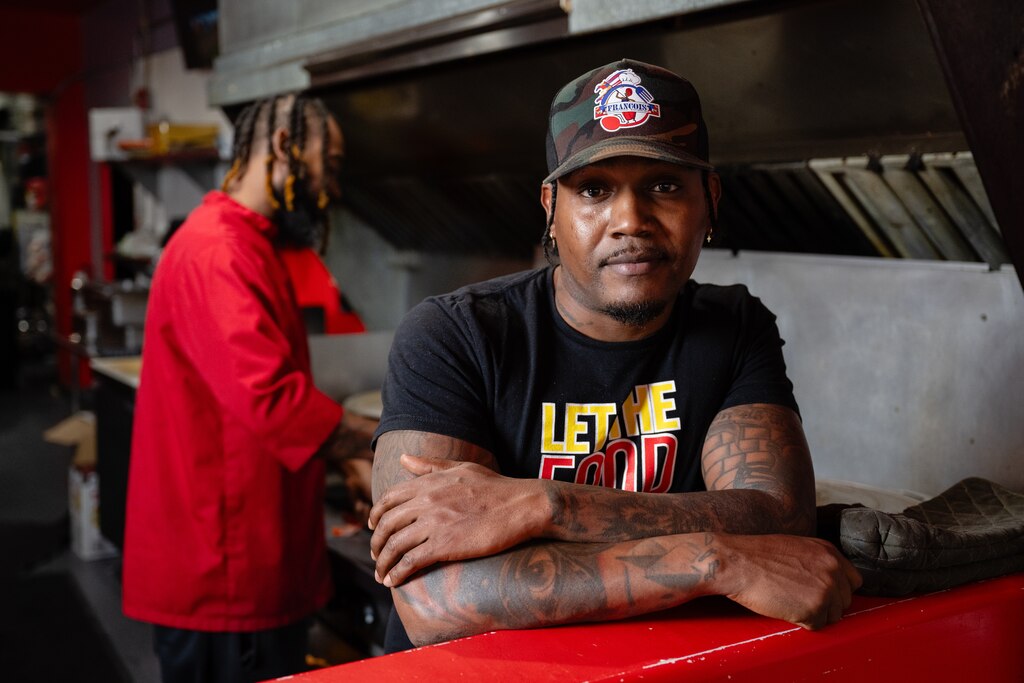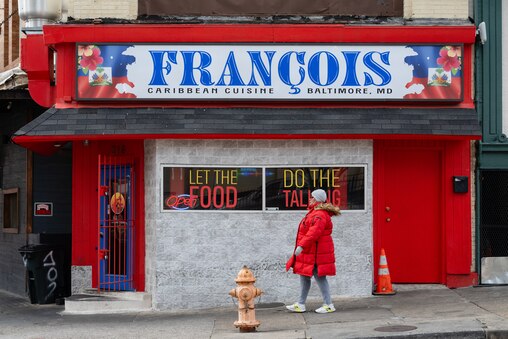As the co-owner of Sunny Side Café, an eatery in Lexington Market known for its shrimp and grits with an étouffée sauce, Kristian Knight-Miller credits her entrepreneurial spirit to her late grandfather, who came to Baltimore as an 11-year-old from Trinidad.
As an adult, he owned a barbershop, two carryout restaurants and a welding company. It’s like Knight-Miller’s predilection for business is built into her DNA.
The impact of the Black diaspora — the voluntary or involuntary movement of Africans and their descendants to other parts of the world — is undeniable in Baltimore, where there are lots of stories like that of Knight-Miller.
And, although there has been an exodus of Black residents from Baltimore in the past decade, leading an overall population decline, its foreign-born Black population has continued to grow. They have thrived in professional careers and opened businesses such as Dominican hair salons, Caribbean restaurants, corner stores and night clubs. And, with both the mayoral and gubernatorial administrations welcoming immigrants, this population could likely continue to increase.
The Baltimore Banner thanks its sponsors. Become one.
From 2010 to 2021, Baltimore’s overall population shrank by about 28,000, or 4.5%, and its Black population by 29,000, or 7.2%. During that same time, the foreign-born population grew by about 4,600 people, or 10.5%, and the African-born population grew by 3,900, or 54%.
There were nearly 8,000 Caribbean-born residents in Baltimore in 2021, a 22% increase since 2010. The total foreign-born Black population in Baltimore was about 17,000 in 2021, an increase of about 3,800, or 29%, since 2010.
Statewide, African-born immigrants have almost quadrupled in population from 60,000 in 2000 to 214,000 in 2022, according to the Migration Policy Institute. Overall, Black immigrants comprise 26% of Maryland’s immigrant population.
Krish O’Mara Vignarajah, president and CEO of Global Refuge, believes Black foreign-born immigrants share similar culture and tradition with Black Americans born in the U.S., allowing for an easier transition for Black immigrants.
Popular Baltimore festivals including Carnival, AFRAM and the Haitian and Caribbean festivals help make those cultural connections, Vignarajah said.
The Baltimore Banner thanks its sponsors. Become one.
“Just being a part of the community that celebrates Black culture through food, culture and dance has a personal significance to families who are arriving and face the challenges of integrating into a new culture, community and, in some cases, a new language,” she said.
The impact of Black immigrants can be seen in the city’s Park Heights neighborhood, home to dozens of immigrant-owned businesses, from Caribbean restaurants to corner stores, according to Catalina Rodriguez-Lima, founding director of the Mayor’s Office of Immigrant Affairs. Like most immigrants, their networks dictate where they go, said Rodriguez-Lima, who attributes that presence to Jamaican immigrants who began arriving in the city prior to the 1990s.
“Their numbers have decreased over the decades, but they may be the pull factor for many of the groups that come to the city,” she said.
Black immigrants help to stimulate the economy and create employment opportunities, Rodriguez-Lima said.
“You have business owners — immigrant owners — and they employ other immigrants that cater to that constituency,” she said. “It’s a cycle that feeds within.”
The Baltimore Banner thanks its sponsors. Become one.
Martin Francois believes his business, François Caribbean Cuisine, provides a culture of familiarity for the Haitian community in Baltimore. Francois, whose family moved from Haiti to the Eastern Shore when he was 9, believes the downtown restaurant is a beacon for Haitians. He serves Haitian dishes such as macaroni au gratin and poulet, a stewed chicken braised in spices and bathed in a rich gravy, that remind people of home.
”They talk to me all the time, and they come in proudly speaking Creole all because they feel a sense of like a home,” said Francois, who has been in Baltimore for nearly 15 years.
Del. Regina T. Boyce, who represents District 43A in Baltimore, predicts that Black immigrants will continue to be a part of growing the city’s middle class. These immigrants, like others moving to the city, are looking for an affordable place to live.
“It’s about what’s affordable and what looks and feels like home. Where are the similarities? Where can I plop down with a family and be in a new place and assimilate and still hold on to my culture?” she said.



Boyce worries that Black immigrants become invisible because the term immigrant has become synonymous with just the Latine population.
The Baltimore Banner thanks its sponsors. Become one.
Boyce recalls having to question why some immigration advocacy groups do not actively represent Black immigrants.
“When groups testify in Annapolis, I often ask those questions why they are advocating for immigrants and none of the immigrants look like the ones in my community,” she said. “They are not advocating equally or not equitably for all immigrants.”
Black immigrants face challenges with structural racism in the United States, which is unlike experiences they deal with in their native countries, where oftentimes they live in more homogenous communities.
“There is a difference between being an American of African descent or Caribbean descent and growing up with racism versus coming from somewhere else,” Boyce explained.
Vignarajah said there have been reports of tensions faced by Black immigrants — particularly between American-born Black people and Black immigrants. Native-born Black Americans have sometimes questioned why certain services are geared toward immigrants when they are also struggling, she said.
The Baltimore Banner thanks its sponsors. Become one.
“A city as beautifully rich as Baltimore can and should serve both populations,” she said. “These demographics ultimately should support and help one another. We’re grateful that the community doesn’t view it as a zero sum.”
Francois, who owns seven properties and had other businesses previously, believes opportunities exist for all in the city. And, as opportunities expand, Baltimore can become similar to other cities known as melting pots, including Washington and New York.
“Baltimore City has a lot of potential, and it’s kind of like this middle city between New York, New Jersey and your D.C. that’s still not fully developed yet,” he said. “There’s a lot of opportunity in Baltimore, for sure, and there’s a lot of support in Baltimore, as long as you support Baltimore back.”
Knight-Miller, who left nursing school to pursue her culinary dreams after an unsavory interaction with health care workers when a family member became ill, has incorporated her immigrant heritage into her business.
Although her menu heavily features spins on American classics — such as red velvet French toast and “ocean” omelet filled with salmon and jumbo shrimp and topped with an Old Bay aioli — she incorporates more Caribbean dishes in her catering orders. She also employs three immigrants on her staff of eight.
The Baltimore Banner thanks its sponsors. Become one.
She feels she can connect better with the public through food and entrepreneurship than nursing.
“I want to feed people’s souls, as opposed to taking away from their souls,” she said as she packed to-go breakfast orders. “This is what fulfills me. This is my calling.”
Data reporter Ramsey Archibald contributed to this story.




Comments
Welcome to The Banner's subscriber-only commenting community. Please review our community guidelines.